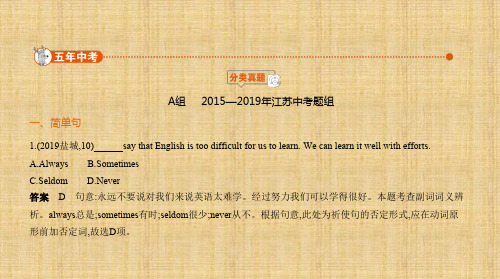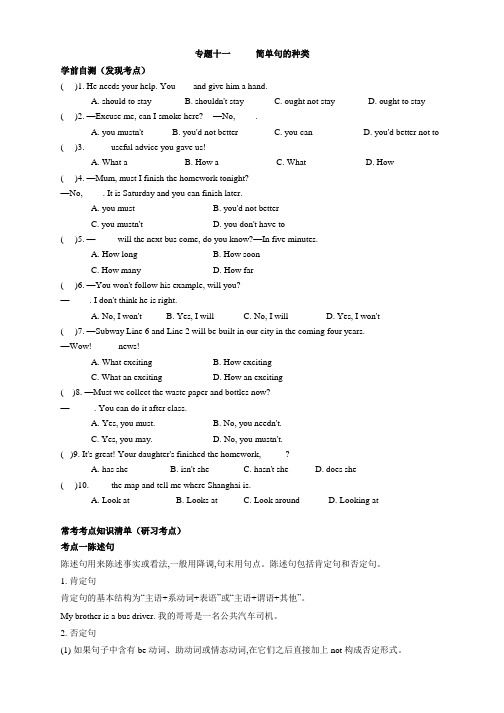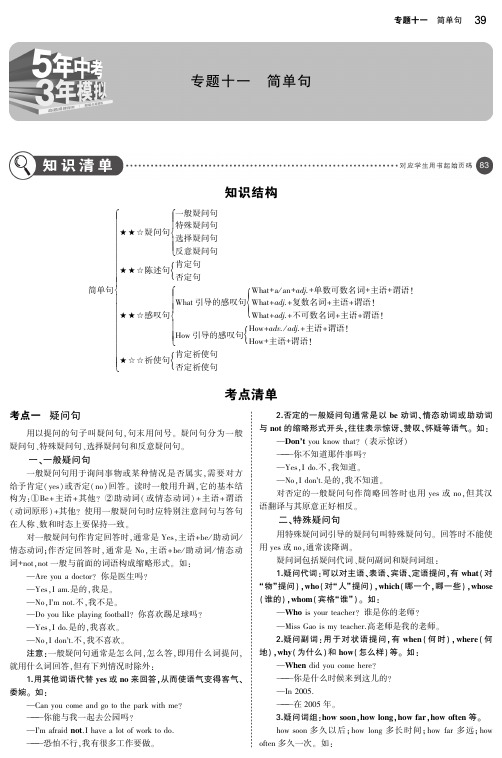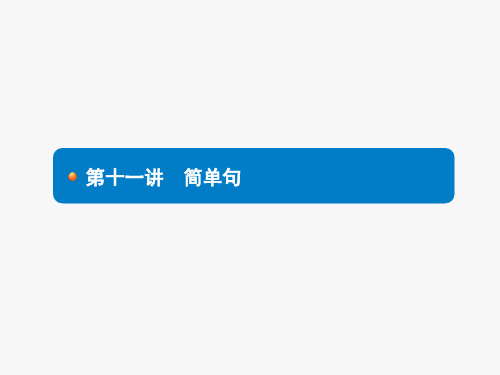聚焦中考英语【专题十一 简单句】
江苏中考英语 专题十一 简单句和并列句及并列连词

.
A.make a statement
B.ask a question
C.give an instruction D.give an exclamation
答案 B 句意:读下面的句子。“南京有很多极好的景点。你曾经去过其中的一个吗?”画线部分是问 一个问题。本题考查句子的语用功能。make a statement做出陈述;ask a question问一个问题;give an instruction给出指示;give an exclamation发出感叹。此处用一般疑问句提出问题,故选B项。 命题思路 本题设计新颖,考查了在交际中问句的作用。在不同的语境中,说话人提问是为了获取不同的 信息或达到不同的目的。考生需要领会问句的不同作用。
brary.
A.or B.but C.and D.since 答案 C 句意:我很久以来就想看《彼得·潘》了,今天我终于从图书馆借来了这本书。本题考查连词。or 或者;but但是;and并且;since自从。根据题意选C项。
2.(2019扬州,13)—Do you think David and Lisa can be good accountants?
意疑问句。反意疑问句的结构为:前肯后否或前否后肯。此句前面是肯定,系动词是is,后面要用is的否定形
式,故选B项。
14.(2015连云港,10)—What programme is so attractive?
—The guard of honor(仪仗队)of the PLA are takiquare.
答案 C 句意:——连接徐州和连云港的高铁工程多久才能完工?——大约2年后。本题考查特殊疑问句
的引导词。how long多长时间,对时间段提问;how far多远,对距离提问;how soon多久以后,对将来时间段提
2020年中考英语总复习基础语法:专题十一 简单句的种类(含答案)

专题十一简单句的种类学前自测(发现考点)( )1. He needs your help. You ___ and give him a hand.A. should to stayB. shouldn't stayC. ought not stayD. ought to stay ( )2. —Excuse me, can I smoke here? —No, ____.A. you mustn'tB. you'd not betterC. you canD. you'd better not to ( )3. _____ useful advice you gave us!A. What aB. How aC. WhatD. How( )4. —Mum, must I finish the homework tonight?—No, ____. It is Saturday and you can finish later.A. you mustB. you'd not betterC. you mustn'tD. you don't have to( )5. — ____ will the next bus come, do you know?—In five minutes.A. How longB. How soonC. How manyD. How far( )6. —You won't follow his example, will you?— ____. I don't think he is right.A. No, I won'tB. Yes, I willC. No, I willD. Yes, I won't( )7. —Subway Line 6 and Line 2 will be built in our city in the coming four years.—Wow! _____ news!A. What excitingB. How excitingC. What an excitingD. How an exciting( )8. —Must we collect the waste paper and bottles now?— _____. You can do it after class.A. Yes, you must.B. No, you needn't.C. Yes, you may.D. No, you mustn't.( )9. It's great! Your daughter's finished the homework, _____?A. has sheB. isn't sheC. hasn't sheD. does she( )10. ____ the map and tell me where Shanghai is.A. Look atB. Looks atC. Look aroundD. Looking at常考考点知识清单(研习考点)考点一陈述句陈述句用来陈述事实或看法,一般用降调,句末用句点。
(广西地区)2019年中考英语复习专题十一简单句(讲解部分)素材(pdf)

{
{
{
{
考点清单
考点一㊀ 疑问句
㊀ ㊀ 用以提问的句子叫疑问句, 句末用问号㊂ 疑问句分为一般 疑问句㊁特殊疑问句㊁选择疑问句和反意疑问句㊂ 一般疑问句用于询问事物或某种情况是否属实, 需要对方 与 not 的缩略形式开头,往往表示惊讶㊁赞叹㊁怀疑等语气㊂ 如: Don������t you know that? ( 表示惊讶) Yes,I do. 不,我知道㊂ 你不知道那件事吗? No,I don������t. 是的,我不知道㊂ 2. 否定的一般疑问句通常是以 be 动词㊁ 情态动词或助动词
3. 疑问词组:how soon,how long,how far,how often 等㊂
often 多久一次㊂ 如:
how soon 多 久 以 后; how long 多 长 时 间; how far 多 远; how
40 ㊀
5 年中考 3 年模拟 How soon will the concert begin? In twenty minutes. 再过多久音乐会就开始了? 再过二十分钟㊂ 答题效率:注意理解句子的意思, 这是解答试题的关键㊂ 根据语 境,将答案代入题干,之后做出正确的判断㊂
注意:否 定 的 特 殊 疑 问 句 一 般 有 劝 告㊁ 建 议㊁ 责 备 等 意 Why don������t you go to the zoo? = Why not go to the zoo? 为什么不去动物园呢?
(2) be 用作助动词, 用于 be doing / be going to do / be done 等 时态或被动语态中,结构为:主语 +be+not+ 动词的现在分词或过 去分词 + 其他㊂ 如: Jim isn������t playing football. 吉姆没在踢足球㊂ The sweater isn������t made of wool. 2. 助动词㊁情态动词的否定式 这件毛衣不是羊毛做的㊂ Man can������t live without water. 没有水人类不能生存㊂ He has no sisters. = He doesn������t have any sisters. 他没有姐妹㊂ (2) never 绝不,从来不㊂ 如: (3) little,few 几乎没有㊂ 如: 教室里几乎没有学生㊂ I have never seen such a man. 我从没见过这样的人㊂ There are few students in the classroom. (4) no one,nobody 没有人㊂ 如: 没有人对这本书感兴趣㊂ (5) nothing 什么也没有㊂ 如: No one / Nobody is interested in the book. There is nothing wrong with you. 你没有什么问题㊂ Neither of them has ever been to Beijing. 他们两个都没有去过北京㊂ (7) seldom 很少;hardly 几乎不㊂ 如: (8) too...to... 太 I seldom go to hospital. 我很少去医院㊂ He is too late to catch the bus. 1. 含有 have 的否定句 以至于不能
中考英语人教版 语法专题突破专题突破十一 简单句

句型三:S(主语)+V(及物动词)+O(宾语)
举例:Children often sing this_song.
↓
↓↓
主语 及物动词 宾语
句型四:S(主语)+V(及物动词)+IO(间接宾语)+DO(直接宾语)
举例:She showed her_friends all_her_pictures.
↓↓
反意疑问句的基本结构
前肯后否
前否后肯
主语+be+其他,be 的 主语+be not+其他,be 的肯定形
否定形式+主语?
式+主语?
主语+动词+其他,助动 主语+助动词+not+动词原形+其
词的否定形式+主语? 他,助动词的肯定形式+主语?
前肯后否
前否后肯
主语+haven't/hasn't+ 主语+have/has+过去分词+其他,
how much 多少(提问不可数名词);多少钱(提问价格)
how often 多久一次 (对频率提问)
how far 多远(提问距离) how heavy 多重(提问重量) how wide 多宽(提问宽度) how tall/high 多高(提问高度) how old 多大(提问年龄)
3.反意疑问句
4.(2020·天水)Let's meet at the school gate, A ? A.shall we B.shall you C.will we D.will you
5.— A is this notebook? —It must be Anna's.Her name is on it. A.Whose B.Who C.Whom D.Which
↓ ↓↓ 主语 系动词 表语 2.The_hat looks nice on you. ↓ ↓↓ 主语 系动词表语
北京中考英语总复习——专题十一 简单句

—No, I don’t. 不,我不喜欢。
句型
例句
—Can you play basketball? 情态动词+主语+动词原形
你会打篮球吗? +其他?
—Yes, I can. 是的,我会。
答语:肯定回答用yes,否定回答用no
(续表)
2. 特殊疑问句
疑问词+动词+其他?
Who stole my car? 谁偷了我的车?
(4)在宾语从句中,若主句的主语是第一人称且为一般现在时,主句的谓语动词 是think, believe, suppose等时,从句的否定词要转移到主句。 (5)“too…to…”句型本身具有否定的含义。 She is too young to go to school. 她年龄太小,还不能去上学。
Have a good holiday! (祝你)假日愉快! Be careful when you use the knife. 当你用刀子时要当心。 Let’s have a rest. 让我们休息一下吧。 You’d better not play football on the street. 你最好不要在街上踢足球。 No parking! 禁止停车!
考点五 感叹句
What an interesting story it is! 它是一个多么有趣的故事! What interesting books you bought us! 你给我们买的书真有趣! What fine weather it is! 多么晴朗的天气呀! How beautiful the flowers are! 这些花是多么美丽呀! How fast he can run! 他跑得真快! How time flies! 时光飞逝!
中考英语 第二部分 语法 专题十一 简单句复习 外研版

带双宾语的动词在间接宾语前加 for 的动词有:buy(购 买), make(制作;造), build(建造), mend(修理),cook(烹饪) 等。
My mother bought me a present. =My mother bought a present for me. 我妈妈给我买了件礼物。
注:如果直接宾语位于间接宾语之前时,间接宾语前须 加介词 to 或 for。
(5)主谓宾补型(S+Vt+O+C)。
此类简单句中,作谓语的如果是 make, keep, want, hear,
listen to, look at, watch, notice, feel, let, have, see, tell, ask, find 等及物动词,其后常接形容词、副词或动词不定式、分
waiting
for two C
hours.(现在分词)
他让我等了两个小时。
考点二 陈述句 陈述句用来说明一个事实或陈述说话人的看法。陈述句 分为肯定式和否定式两种,句末用句号,读时用降调,有五 种基本句型。 1.陈述句的肯定式 (1)主语+连系动词+表语。 We are happy. 我们很快乐。
考点三 疑问句 疑问句用于提出问题,句末用问号(?)。可分为四种: 一般疑问句、选择疑问句、反意疑问句和特殊疑问句。 (一)一般疑问句 一般疑问句是可用 yes 或 no 来回答的问句。它总是以 be 动词、情态动词或助动词开头。有时也可用 Not at all.和 Certainly.等回答。 —Would you like some more? 你想再来一些吗? —No, thanks. I'm full. 不,谢谢。我饱了。
(3)主谓宾型(S+Vt+O)。 此类简单句中,句子的谓语动词为及物动词,其后接名 词、代词或相当于名词的词、短语或句子作宾语。
初中英语中考语法复习 第十一讲 简单句

5.主语+谓语+宾语+宾语补足语
这种句型可简称为主谓宾补结构, 其中补语是宾语补足语, 与宾
语一起构成复合宾语。如:
We must keep our classroom
主语 谓语
宾语
宾语cle补an足语.
我们必须保持教室干净。
9
考点一 考点二 考点三 考点四
考试目标锁定
规律方法探究
简单句的种类 1.陈述句 用来陈述一件事实或表达说话者看法的句子叫作陈述句, 句末 用句号。陈述句分为肯定句和否定句。
8
考点一 考点二 考点三 考点四
考试目标锁定
规律方法探究
4.主语+谓语+间接宾语+直接宾语
这种句型可称为主谓双宾结构, 其谓语应是可跟双宾语的及物
动词, 两个宾语一个是间接宾语, 一个是直接宾语。
Her father 主语
bought 谓语
her 间接宾语
直a接d宾oll语.
她父亲给她买了个布娃娃。
5
考点一 考点二 考点三 考点四
考试目标锁定
规律方法探究
简单句的基本句型 句子按照其结构可分为简单句、并列句和复合句。其中简单句 又可分为五大基本句型。在英语中的各类复杂句子也都是由这五 种基本句型扩展而成的。 1.主语+谓语 这种句型简称为主谓结构, 其谓语一般都是不及物动词。 The boy laughed at last. 最后这个男孩笑了。
成分 作用
主语 句子说的是谁或是什么
说明主语的行为动作或所处 谓语 的状态, 有人称、数和时态
的变化
宾语 指一个动作的接受者
充当此成分的词 名词、代词、动词-ing 形 式、动词不定式等
中考英语总复习 专题11 简单句课件

不可数名词+主语+谓语!
What fine weather it is!
How+主语+谓语!
How time flies! How I miss you!
how 型
How+形容词/副词+主语+谓 语!
How brave the hero is! How fast he drives!
How+形容词+a/an+单数可数 How clever a boy he
How much are your
句
how much 对价格提问,或 对不可数名词的量提问
pants? 你的短裤多少钱?
How much milk do we need?
我们需要多少牛
奶?
第八页,共二十六页。
句 式
概念
用法
例句
以特殊疑问词 how long 对长度提问或对 开头的疑问句 一段时间提问 叫作特殊疑问 句
How long is the ruler? 这把尺子多长? How long does it take you to get to school by bike? 骑自行车到学校花 费你多长时间?
how often 询问多久一次
How often do you go shopping? 你多久购物一次?
第十页,共二十六页。
(二)一般(yībān)疑问句
第十一页,共二十六页。
归纳(guīnà)通常以be动词、情态动词或助动词开头的疑问句,用yes,no来回 答。如:
—Are you a student?你是一名学生吗? —Yes,I am.是的,我是。
第十二页,共二十六页。
中考英语 语法专题突破专题突破十一 简单句 (2)

3. Don't(not) call me Wang Wang.It's my dog's name. 4. Don't (not step) on the grass.It's a rule of the park. 5. sDtoepn't (not be) late again,Bill. 6.Lbete's sta (stay) at home and watch TV.
y
由于祈使句的句型比较固定,考生应重点熟记以下两种形式:
形式
句式结构
例句
①(Please+)动词原形+ Please listen to me carefully!
其他!
请仔细听我讲!
肯定形式 ②Be+表语!
Be careful!小心!
③Let+宾语+动词原形 Let's have another try.
择疑 +or+另一
你来自银川还是固原?
问句 选项?
—I am from Guyuan.我来自固原。
特殊选 择疑 问句
—Which color do you like better,red or 特殊疑问 green?你更喜欢哪种颜色,红色还是绿色? 句,A or B? —Green.绿色。/Neither.I like orange best.都
what 数(+主语+谓语)!
are)!多有趣的书呀!
What+形容词+不可数名词 What nice music (it is)!多么美妙
(+主语+谓语)!
的音乐啊!
How + 形 容 词 / 副 How fine the weather is!天气真好! How well he plays the violin!他的小提琴拉
2020届中考英语语法专练 11简单句(含答案)

(十一)简单句Ⅰ.词汇运用。
A)从方框中选择恰当的单词或词组填空。
how much,how,how soon,who,what1.—Who do you study for tests with?—I study with my friends.2.—What are you talking about?—A math problem.3.—How__much does your coat cost?—It costs only 50 dollars.4.—How__soon will Mr.Brown be back?—In an hour.5.—Wow!How beautiful the music is!—Yes.That's my favorite.B)用括号内所给单词的适当形式填空。
6.Don't(do) walk on the grass,or it will “cry”.7.—Get(get) dressed now!We have to go in ten minutes.—OK,Mom.8.Mary often goes to school on foot,doesn't(does) she?9.—Don't forget to come to my birthday party tomorrow.—I won't(will).10.Tom as well as his parents is(be) going to London for traveling next month.Ⅱ.按要求完成句子,每空一词。
1.I borrowed an English book from my classmate.(改为同义句)My classmate lent an English book to me.2.You shouldn't shout back to your parents!(改为祈使句)Don't shout back to your parents!3.Let's discuss where we will go after our exam.(改为简单句)Let's discuss where to go after our exam.4.Mary is the thinnest girl in my class.(改为同义句)Mary is thinner than any other girl in my class.5.This movie is very interesting.(改为感叹句)How interesting this movie is!Ⅲ.单项选择。
- 1、下载文档前请自行甄别文档内容的完整性,平台不提供额外的编辑、内容补充、找答案等附加服务。
- 2、"仅部分预览"的文档,不可在线预览部分如存在完整性等问题,可反馈申请退款(可完整预览的文档不适用该条件!)。
- 3、如文档侵犯您的权益,请联系客服反馈,我们会尽快为您处理(人工客服工作时间:9:00-18:30)。
第三讲 疑问句
【即时自测】 1) —_______B_ your friend like playing football? —No,she ____. She likes playing table tennis. A. Do;don't B. Does;doesn't C. Do;do D. Doesn't;does 2) —__C__ does your cousin usually go to work on foot? —He says it's good for his health. A. Where B. When C. Why D. How
—OK, no problem.
A. don't forget telling B. don't forget to tell
C. not forget to tell D. forget to tell
5) _____Cmore cheese, milk and yogurt to make your teeth strong. They are rich in calcium(钙). A. Having B. Don't have C. Have D. No hessed now! We have to go in ten minutes.
—OK, Mom.
A. Getting B. Get C. To get D. Gets 4) —Lily, please _______ Bme your new number after you get there.
②当陈述部分是let's do sth.时,疑问部分须用shall we来反问;而当陈述部分是let sb. do sth.时,疑问部分用will you来反问。
Let's go to the park, shall we? 咱们去公园,好吗? Let us help you, will you? 让我们来帮你,好吗? ③当陈述部分为I am形式时,反意疑问部分应该用aren't I。 I'm right, aren't I? 我是对的,是吗?
祈使句的否定式 祈使句的强调式
感叹句的构成what引导的感叹句
感叹句
how引导的感叹句
感叹句的省略
并列句
倒装句 主谓一致和There be句型
第一讲 祈使句和感叹句 1. 祈使句 祈使句是用来表示请求、命令、叮嘱、邀请、劝告等。祈使句的主语you往往省 略,谓语动词用原形,句末用感叹号,读降调。 ※肯定的祈使句 ①句型:动词原形+其他成分。如: Be careful! 小心! ②“Do+祈使句”表示一种强烈的感情或请求,do起强调作用。 ③please用在祈使句中可以表示一种客气的语气,但please用在句末时,必须用逗 号与其余部分隔开。如:
Let us not be late. 让我们不要迟到吧! Don't let the boy play football in the street. 不要让这个男孩在街上踢足球。 【拓展提示】 在“祈使句+陈述句”的句型中, 祈使句和陈述句之间要用连词and或or连接, 其 中and表顺承(那么;就), or表转折(否则;要不然)。如: Hurry up, or we'll miss the last bus. 快点儿, 不然我们会错过最后一班车。 Study hard, and you will make great progress in English. 努力学习, 你就会在英语方面取得很大的进步。
聚焦中考英语 专题十一 简单句 金铺中学 卫建华
简单句的五 种基本句型
主语+不及物动词 主语+及物动词+宾语 主语+系动词+表语 主语+及物动词+间接宾语+直接宾语 主语+及物动词+宾语+宾语补足语
陈述句肯定句 否定句
一般疑问句一般疑问句的结构 一般疑问句的答语
D 6) _____ big success the charity show was! We collected a lot of school things.
A. How B. What C. How a D. What a
7) —_______ exciting the speech about “Belt and Road” was! A
第三讲 疑问句 1. 一般疑问句 ※一般疑问句结构 一般疑问句的基本结构为:①be+主语+其他;②助动词(或情态动词)+主语+ 谓语(动词原形)+其他。对一般疑问句作肯定回答时,通常是:Yes,主语+be/助 动词/情态动词;作否定回答时,通常是:No,主语+be/助动词/情态动词+not。 not一般要与前面的词语构成缩略形式。 ※一般疑问句中需注意的几个问题: ①情态动词must提问时,否定回答用needn't或don't have to。如:
— Of course! It was a really great inspiration(鼓舞) to the world. A. How B. What C. How an D. What an
8) —Kate has won the first prize in the singing competition. A
2) —Hi, Kate.We won't take part in the activity this Saturday afternoon. What about you?
—_________. A. So I wilDl B. So will I
C. Neither I will D. Neither will I
2. 特殊疑问句 ※由疑问词引导的疑问句叫特殊疑问句,不能用Yes或No回答,读时用降调。特 殊疑问句由“疑问代词或疑问副词+一般疑问句”构成。
3. 选择疑问句 提出两种或两种以上的情况,要求对方做出选择回答的问句叫选择疑问句。选择疑 问句中两种或两种以上的情况用or连接,回答时不能用yes或no,要用一个完整的句子 或其省略形式。语调一般是前升后降。选择疑问句可以分为一般选择疑问句和特殊疑 问句两种。 ①一般选择疑问句:一般疑问句+or+被选择的部分?如: —Do you like apples or pears?你喜欢苹果还是梨? —I like pears. 我喜欢梨。 ②特殊选择疑问句:特殊疑问句+A or B?如: —Which would you like better, tea or coffee?茶或咖啡,你更想要哪一种? —I'd like coffee. 我想要咖啡。
特殊疑问句的构成及用法
简 单
疑问句
特殊疑问句特殊疑问句疑疑问问代副词词
选择疑问句选择疑问句的结构 选择疑问句的答语
句
反意疑问句的构成
反意疑问句反意疑问句的答语 一些特殊句式的反意疑问句
祈使句的结构 let引导的祈使句 祈使句
3) —I'm not going swimming tomorrow afternoon. B
—____ . I have to clean up my bedroom. A. So am I B. Neither am I C. Neither I am D. So I am 4) —I don't understand what the teacher said in class. —____D.He spoke so quickly, and I couldn't catch him. A. Neither I do B. So I do C. So do I D. Neither do I
—Must I go now?我必须现在就去吗? —Yes, you must./No, you needn't. 是的。/不,不必。 ②否定的一般疑问句通常是以be动词、情态动词或助动词与not的缩略形式开 头,往往表示惊讶、赞叹、怀疑等语气。注意yes和no在翻译成中文时与其原意 正好相反。如: —Don't you hear of that?难道你没听说过这件事?(表示惊讶) —Yes, I do./No, I don't. 不,我听说过。/是的,我没有听说过。
4. 反意疑问句 由“陈述句+简短问句”组成,表示问话者欲对陈述句部分的内容做出进一步证 实。反意疑问句若前部分为肯定句,后一部分就要用否定形式;若前一部分用否定 形式,后一部分就用肯定形式。即“前肯后否,前否后肯”。 几种特殊的反意疑问句: ①如果陈述部分是肯定或否定的祈使句,疑问部分须用will you。 Listen to me carefully, will you? 仔细听我说,好吗?
【即时自测】
1) —He hasn't decided whether to go hikingDyet. —If his wife doesn't go hiking, _________ .
A. so will he B. so he does C. neither does he D. neither will he
Close the door, please. 请关门! ※否定的祈使句 ①通常句型:Don't+动词原形+其他成分。如: Don't be late for school again!别再迟到了! ②用Never开头:Never+动词原形+其他成分。如: Never leave today's work for tomorrow!不要把今天的工作留到明天! ※Let引导的祈使句 以Let开头的句子也是祈使句,表示陈述和建议。其否定形式有两种:Let…not或 Don't…。如:
5) I don't know whether I should attend this speech about skills of communication. But
